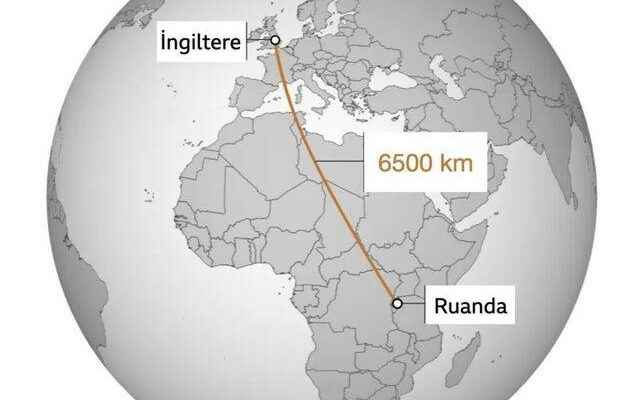The UK’s Supreme Court has authorized a flight to be made on Tuesday next week as part of a plan to send asylum seekers to Rwanda.
The objection of those campaigning against the sending of asylum seekers in England to the East African country Rwanda was also rejected. However, the case will be heard in the Court of Appeal on Monday.
According to the new practice, those who enter the UK illegally will be sent to Rwanda to apply for asylum.
About 31 people were told they could be on the first flight.
It has been learned that there will be a judicial review before the end of July, during which the Supreme Court as a whole will hear the appeals.
Supreme Court Justice Sir Jonathan Mark Swift agreed in his decision that there was a “material public interest” in Home Secretary Priti Patel’s ability to implement her policies.
Minister Patel praised the Supreme Court decision and said that the government would continue with its plans. Prime Minister Boris Johnson described the decision as “good news”.
However, the campaigners who filed the case expressed concern for the situation of the “forced deportation” and confirmed that they would appeal the decision.
The government has made it clear that with the plan, many applications will now be handled by Rwanda, and hopes the implementation will deter asylum seekers from crossing the English Channel.
Asylum applications of persons sent to Rwanda will be considered in that country; Migrants will also be provided with shelter and support in this process. If the asylum request is successful, the migrants will be able to stay in Rwanda with access to education and support for up to five years.
Persons whose asylum applications in Rwanda are unsuccessful will be granted the right to apply for a visa again under other immigration rules. However, they will still face the risk of deportation.
In addition to the flight, campaigners are trying to prevent the resettlement of people in Rwanda.
Lawyers have expressed concern about the shortcomings of Rwanda’s asylum system and the possibility of people being sent to countries where they will be persecuted, known as the “repatriation process”.
Interior Ministry lawyers said the court should stop legal objections to the practice because it is in the public interest, and urged the judge to reject appeals on behalf of asylum seekers.
Judge Swift said there was no evidence in her decision that there was “maltreatment, refoulement” or anything that violated her rights under Article 3 of the UK’s Human Rights Act.
The relevant article is about torture of people in England; from inhuman, degrading treatment or punishment; It protects against deportation or extradition to a country where there is a real risk that they will face torture, inhuman or degrading treatment.
But the judge gave campaigners and immigrants the right to appeal the decision, and said the Court of Appeals could hear the case on Monday.
The judge also rejected a request for temporary assistance for two people who faced deportation Tuesday and will still be on the plane bound for Rwanda.
This year, more than 4,850 people crossed the English Channel by boat to England.
The scheme primarily targets single men who have arrived in the UK by boat after 1 January.
Critics of the plan say the move was “brutal” and voice their concerns over Rwanda’s human rights record.
Last year, the British government reported to the United Nations (UN) concerns about “restriction of civil and political rights and freedom of the press” in Rwanda. After the signing of the refugee agreement, Prime Minister Boris Johnson described Rwanda as “one of the safest countries in the world”.
Yvette Cooper, Home Affairs spokesperson for the main opposition Labor Party in England, said the plan was “totally dysfunctional and excessively costly”.
There has been criticism of the plan from the ruling Conservative Party, as well as opposition parties.
More than 160 non-governmental organizations called on the government to abandon the plan.
